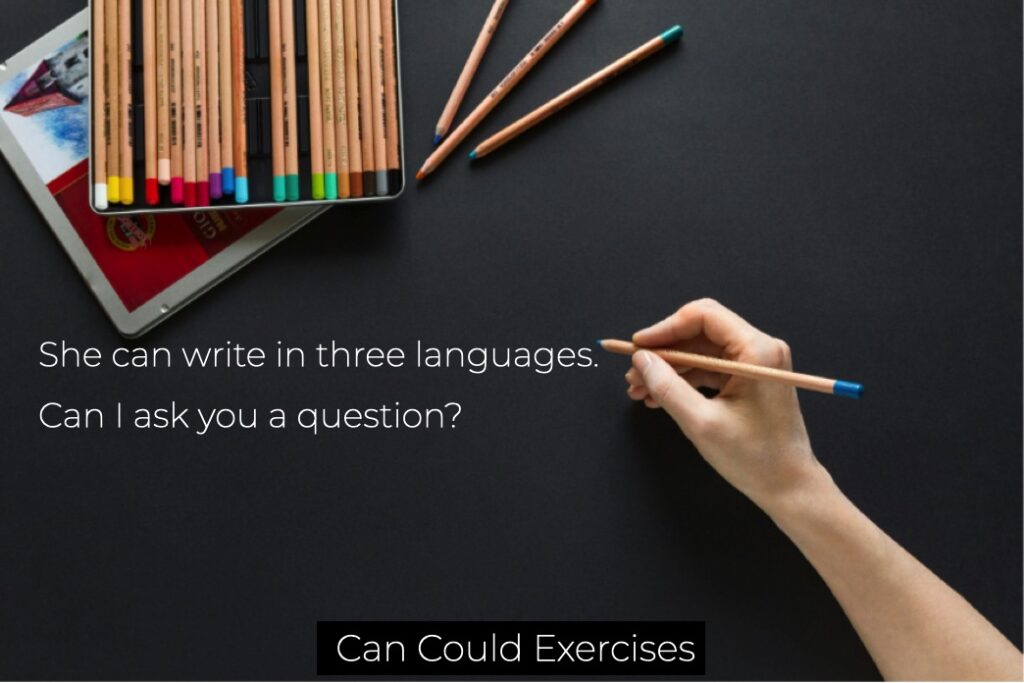“Can” and “could” are two of the most commonly used modal verbs in English. They are essential for expressing ability, possibility, permission, and requests. This blog post you will explore “can” and “could” exercises and how to use them, and provide plenty of examples to help you master their usage.

What Are “Can” and “Could”?
Can
“Can” is a modal verb used to indicate ability, permission, possibility, and requests. It is used in the present tense and is followed by the base form of a verb.
- Example: She can swim very well.
- Example: Can I borrow your pen?
Could
“Could” is the past tense of “can,” but it is also used to express ability, permission, possibility, and polite requests in the present or future. It often conveys a more polite or less certain tone than “can.”
- Example: When I was younger, I could run fast.
- Example: Could you please open the window?
How to Use “Can” and “Could”
Expressing Ability
Can: Used to express present ability.
- Example: I can play the guitar.
Could: Used to express past ability or conditional present/future ability.
- Example: When I was a child, I could climb trees.
Asking for Permission
Can: Used to ask for permission in an informal or direct manner.
- Example: Can I leave early today?
Could: Used to ask for permission in a more polite or formal way.
- Example: Could I leave early today, please?
Making Requests
Can: Used for direct requests.
- Example: Can you help me with my homework?
Could: Used for polite or less direct requests.
- Example: Could you help me with my homework?
Expressing Possibility
Can: Used to express general possibilities.
- Example: Anyone can join the club.
Could: Used to express a possibility that is less certain or hypothetical.
- Example: It could rain tomorrow.
Download can could examples and exercises PDF from this link.
30 Examples of “Can” and “Could”
Using “Can”
- She can speak three languages.
- Can you come to the meeting tomorrow?
- I can finish the project by Monday.
- Can you hear the music from your room?
- He can solve this math problem easily.
- You can use my computer if you need to.
- Can they see us from here?
- We can leave as soon as you are ready.
- Can you believe how fast he runs?
- This plant can grow up to two meters tall.
- Can I ask you a question?
- Birds can fly long distances.
- Can you tell me the time?
- She can read without her glasses.
- Can I have some water, please?
Using “Could”
- When I was a child, I could play outside all day.
- Could you pass the salt, please?
- She said she could help us with the project.
- I could see the mountains from my window.
- Could you lend me your book?
- We could go to the beach this weekend.
- He could be the next president.
- Could it be true?
- When we were kids, we could ride our bikes everywhere.
- I could use a break right now.
- Could I use your phone?
- If we hurry, we could catch the train.
- I could swim faster when I was younger.
- Could you give me a moment?
- He could have been a great artist.
What’s your English level?
Discover your level now: A1/A2/B1/B2/C1/C2 and GET your certificate!
“Can” and “Could” Exercises
Test your understanding of “can” and “could” with below exercises. Choose the correct word to complete each sentence.
Questions
- ____ you help me with this box? (Can/Could)
- When I was young, I ____ run very fast. (can/could)
- ____ I borrow your car tonight? (Can/Could)
- She ____ speak Japanese fluently. (can/could)
- If I had more time, I ____ finish the project. (can/could)
- ____ you tell me where the nearest bank is? (Can/Could)
- He ____ play the piano when he was five. (can/could)
- ____ it be that he forgot our meeting? (Can/Could)
- They ____ be at home right now. (can/could)
- ____ I get you anything else? (Can/Could)
Answers
- Can
- could
- Could
- can
- could
- Could
- could
- Could
- could
- Can
Conclusion
“Can” and “could” exercises are versatile modal verbs that play a crucial role in expressing ability, permission, possibility, and making requests. By understanding the differences and practicing with examples, you can improve your English communication skills. Use this guide as a reference to master the usage of “can” and “could” in various contexts.





